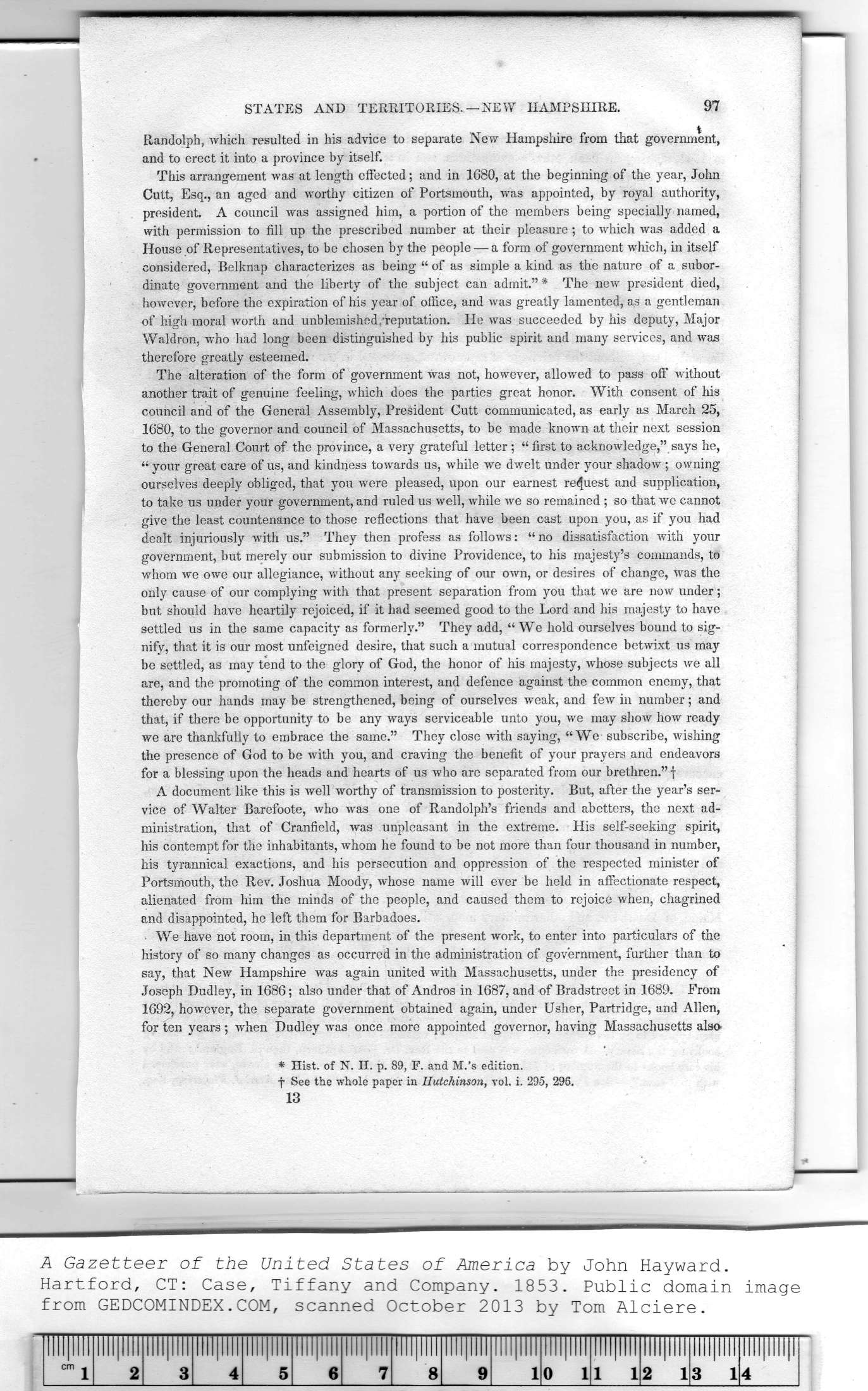|
|
Note: Ctrl and + increases the font size of the text below, Ctrl and - decreases it, and Ctrl and 0 resets it to default size.
STATES AND TERRITORIES.—NEW HAMPSHIRE. 97
Randolph, which resulted in his advice to separate New Hampshire from that government,
and to erect it into a province by itself.
This arrangement was at length effected; and in 1680, at the beginning of the year, John
Cutt, Esq., an aged and worthy citizen of Portsmouth, was appointed, by royal authority,
president. A council was assigned him, a portion of the members being specially named,
with permission to fill up the prescribed number at their pleasure ; to which was added a
House of Representatives, to be chosen by the people — a form of government which, in itself
considered, Belknap characterizes as being “of as simple a kind as the nature of a subor-
dinate government and the liberty of the subject can admit." * The new president died,
however, before the expiration of his year of office, and was greatly lamented, as a gentleman
of high moral worth and unblemished.'reputation. He was succeeded by his deputy, Major
Waldron, who had long been distinguished by his public spirit and many services, and was
therefore greatly esteemed.
The alteration of the form of government was not, however, allowed to pass off without
another trait of genuine feeling, which does the parties great honor. With consent of his
council and of the General Assembly, President Cutt communicated, as early as March 25,
1680, to the governor and council of Massachusetts, to be made known at their next session
to the General Court of the province, a very grateful letter; “first to acknowledge," says he,
“ your great care of us, and kindness towards us, while we dwelt under your shadow ; owning
ourselves deeply obliged, that you were pleased, upon our earnest request and supplication,
to take us under your government, and ruled us well, while we so remained ; so that we cannot
give the least countenance to those reflections that have been cast upon you, as if you had
dealt injuriously with us." They then profess as follows: “no dissatisfaction with your
government, but merely our submission to divine Providence, to his majesty's commands, to
whom we owe our allegiance, without any seeking of our own, or desires of change, was the
only cause of our complying with that present separation from you that we are now under;
but should have heartily rejoiced, if it had seemed good to the Lord and his majesty to have
settled us in the same capacity as formerly." They add, “We hold ourselves bound to sig-
nify, that it is our most unfeigned desire, that such a mutual correspondence betwixt us may
be settled, as may tend to the glory of God, the honor of his majesty, whose subjects we all
are, and the promoting of the common interest, and defence against the common enemy, that
thereby our hands may be strengthened, being of ourselves weak, and few in number; and
that, if there be opportunity to be any ways serviceable unto you, we may show how ready
we are thankfully to embrace the same." They close with saying, “We subscribe, wishing
the presence of God to be with you, and craving the benefit of your prayers and endeavors
for a blessing upon the heads and hearts of us who are separated from our brethren." f
A document like this is well worthy of transmission to posterity. But, after the year's ser-
vice of Walter Barefoote, who was one of Randolph's friends and abetters, the next ad-
ministration, that of Cranfield, was unpleasant in the extreme. His self-seeking spirit,
his contempt for the inhabitants, whom he found to be not more than four thousand in number,
his tyrannical exactions, and his persecution and oppression of the respected minister of
Portsmouth, the Rev. Joshua Moody, whose name will ever be held in affectionate respect,
alienated from him the minds of the people, and caused them to rejoice when, chagrined
and disappointed, he left them for Barbadoes.
We have not room, in this department of the present work, to enter into particulars of the
history of so many changes as occurred in the administration of government, further than to
say, that New Hampshire was again united with Massachusetts, under the presidency of
Joseph Dudley, in 1686; also under that of Andros in 1687, and of Bradstreet in 1689. From
1692, however, the separate government obtained again, under Usher, Partridge, and Allen,
for ten years; when Dudley was once more appointed governor, having Massachusetts also
* Hist, of N. H. p. 89, F. and M.'s edition.
f See the whole paper in Hutchinson, vol. i. 295, 296.
13
A Gazetteer of the United States of America by John Hayward.
Hartford, CT: Case, Tiffany and Company. 1853. Public domain image
|
